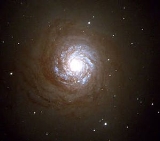
NGC 7252
Encyclopedia
NGC 7252 is a peculiar galaxy
resulting from an interaction between two galaxies that started a billion years ago. It is located 220 million light years away in the constellation
Aquarius
. It is also called Atoms for Peace galaxy, a nickname which comes from its loop-like structure, made of stars, that resembles a diagram of an electron orbiting an atomic nucleus.
. With an apparent magnitude of 12.7, it is bright enough to be seen by amateur astronomers as a faint small fuzzy blob. Large loops of gas and stars around it makes the galaxy quite peculiar. Thus, it is also Arp 226 (the 226th entry in Arp’s list of peculiar galaxies).
gave the "Atoms for Peace" speech. The speech was concerned about promoting nuclear power for peaceful purposes. Significant to the scientific community, the name of the speech was given to this peculiar galaxy. The two galaxies merging also resembles nuclear fusion and the galaxies giant loops resemble a diagram of electrons orbiting the nucleus of an atom.
after its expected collision with the Andromeda galaxy
.
in the galaxy.
Peculiar galaxy
A peculiar galaxy is a galaxy which is unusual in its size, shape, or composition. Peculiar galaxies come about as a result of interactions between galaxies, and they may contain atypical amounts of dust or gas, may have higher or lower surface brightness than a typical galaxy, or may have...
resulting from an interaction between two galaxies that started a billion years ago. It is located 220 million light years away in the constellation
Constellation
In modern astronomy, a constellation is an internationally defined area of the celestial sphere. These areas are grouped around asterisms, patterns formed by prominent stars within apparent proximity to one another on Earth's night sky....
Aquarius
Aquarius (constellation)
Aquarius is a constellation of the zodiac, situated between Capricornus and Pisces. Its name is Latin for "water-bearer" or "cup-bearer", and its symbol is , a representation of water....
. It is also called Atoms for Peace galaxy, a nickname which comes from its loop-like structure, made of stars, that resembles a diagram of an electron orbiting an atomic nucleus.
General
NGC 7252 is located in the southern part of AquariusAquarius (constellation)
Aquarius is a constellation of the zodiac, situated between Capricornus and Pisces. Its name is Latin for "water-bearer" or "cup-bearer", and its symbol is , a representation of water....
. With an apparent magnitude of 12.7, it is bright enough to be seen by amateur astronomers as a faint small fuzzy blob. Large loops of gas and stars around it makes the galaxy quite peculiar. Thus, it is also Arp 226 (the 226th entry in Arp’s list of peculiar galaxies).
Naming
In December 1953, U.S. President Dwight D. EisenhowerDwight D. Eisenhower
Dwight David "Ike" Eisenhower was the 34th President of the United States, from 1953 until 1961. He was a five-star general in the United States Army...
gave the "Atoms for Peace" speech. The speech was concerned about promoting nuclear power for peaceful purposes. Significant to the scientific community, the name of the speech was given to this peculiar galaxy. The two galaxies merging also resembles nuclear fusion and the galaxies giant loops resemble a diagram of electrons orbiting the nucleus of an atom.
Interest
The galaxy is a result of a collision of two galaxies. This collision is an opportunity for astronomers to study such mergers and to predict the future of our Milky WayMilky Way
The Milky Way is the galaxy that contains the Solar System. This name derives from its appearance as a dim un-resolved "milky" glowing band arching across the night sky...
after its expected collision with the Andromeda galaxy
Andromeda Galaxy
The Andromeda Galaxy is a spiral galaxy approximately 2.5 million light-years from Earth in the constellation Andromeda. It is also known as Messier 31, M31, or NGC 224, and is often referred to as the Great Andromeda Nebula in older texts. Andromeda is the nearest spiral galaxy to the...
.
X-ray emissions
X-ray emissions were observed in NGC 7252. This suggests the existence of nuclear activity or an intermediate-mass black holeBlack hole
A black hole is a region of spacetime from which nothing, not even light, can escape. The theory of general relativity predicts that a sufficiently compact mass will deform spacetime to form a black hole. Around a black hole there is a mathematically defined surface called an event horizon that...
in the galaxy.

